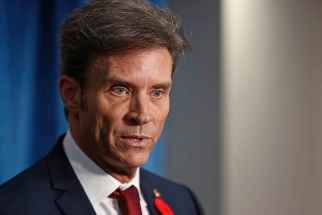End of subsidy throws shade on solar industry
Read this article for free:
or
Already have an account? Log in here »
To continue reading, please subscribe:
Monthly Digital Subscription
$0 for the first 4 weeks*
- Enjoy unlimited reading on winnipegfreepress.com
- Read the E-Edition, our digital replica newspaper
- Access News Break, our award-winning app
- Play interactive puzzles
*No charge for 4 weeks then price increases to the regular rate of $19.00 plus GST every four weeks. Offer available to new and qualified returning subscribers only. Cancel any time.
Monthly Digital Subscription
$4.75/week*
- Enjoy unlimited reading on winnipegfreepress.com
- Read the E-Edition, our digital replica newspaper
- Access News Break, our award-winning app
- Play interactive puzzles
*Billed as $19 plus GST every four weeks. Cancel any time.
To continue reading, please subscribe:
Add Free Press access to your Brandon Sun subscription for only an additional
$1 for the first 4 weeks*
*Your next subscription payment will increase by $1.00 and you will be charged $16.99 plus GST for four weeks. After four weeks, your payment will increase to $23.99 plus GST every four weeks.
Read unlimited articles for free today:
or
Already have an account? Log in here »
Hey there, time traveller!
This article was published 18/12/2018 (2549 days ago), so information in it may no longer be current.
The sunny days are over for some Manitoba companies since the termination of Manitoba Hydro’s Power Smart’s two year solar power incentive program.
The program that provided a $1 per watt incentive on approved solar power installations generated far more interest than Manitoba Hydro anticipated — a total of more than 50 mega watts according to some — ended in April as per the original plan.
While the end date was not a surprise, some in the business are bemoaning that fact it was a hard stop and not phased out as is often the practice for such programs.

Riley Unger, the sales manager at Living Skies Solar in Headingley that was formed a couple of months after the incentive program began, said his company has no choice but to pack up and move to Saskatchewan.
“Without any new sales our hands were forced to protect past customers,” he said. “We have to be in Saskatchewan to get some new sales to keep things running.”
Saskatchewan’s incentive program is 61 cents per watt and it was recently renewed again for three years and has been a stable market for many years.
Unger believes that Manitoba Hydro did not make it easy for companies like his to service the strong demand that was created by the incentive and that it changed the policy regarding selling the power into Manitoba Hydro’s grid. He said it also will mean the potential for the loss of hundreds of jobs in the province.
“it’s pretty disappointing to have to go to Saskatchewan to keep chasing a dream,” said the University of Manitoba environmental science grad. “It’s truly a loss to the province.”
The $1.00 per watt or $1,000 per kilowatt incentive was the richest in the country when the program was announced in the spring of 2016. Manitoba Hydro officials have acknowledged the 1,500 applications for installations were much more — as much as 10 times more — than was originally anticipated.
‘It’s pretty disappointing to have to go to Saskatchewan to keep chasing a dream. It’s truly a loss to the province’
– Riley Unger, sales manager at Living Skies Solar
While the incentive did open up a groundswell of demand it remains the case that even in the current climate of rising rates Manitoba remains one of the cheapest electricity jurisdictions in North America.
On the other hand, electricity rates in Saskatchewan are among the highest in the country making solar power there that much more of an economically attractive alternative.
A mitigating factor in the sudden end of the successful pilot project — that generated more than $100 million in private sector investment and diversified the electrical grid that was solely dependent on the generation of hydroelectricity — is the transition of the demand side management in Manitoba from Power Smart to a newly created Crown entity called Efficiency Manitoba.
That organization is in the final stages of its incorporation and has still not hired its senior management team.
Bruce Owen, spokesman for Manitoba Hydro, said, “Any decision on any type of program regarding solar energy will have to be discussed with Efficiency Manitoba and Manitoba Hydro because it is plugged into our grid. That is down the road.”
Some in the industry believe it is reasonable to expect Efficiency Manitoba will eventually come up with a renewed or updated solar incentive program.
A spokesperson for the province, said, “We will have an announcement on a new CEO very soon, and we will not prejudge what the incoming CEO and the board of directors decide in terms of the solar energy program.”
Sycamore Energy Inc. (which also operates as Solar Manitoba), is the largest and one of the oldest players in solar industry in the province, is also setting up shop in Saskatchewan but is not leaving Manitoba.
Justin Phillips, CEO of Sycamore, said, it’s not good for the industry to have the incentive program shut down cold turkey. But he believes that once Efficiency Manitoba is up and running it will re-investigate a program to support the solar industry. He also believes that since the cost of solar power and the increased efficiency of installation has improved in just two years, that an economic case can still be made for solar, even in Manitoba.
“Right from the beginning they said it was a two year pilot project,” Phillips said. “We will be fine. We stabilized our business. We also still have about 180 projects left to install in the province (that will be covered by the incentive program).”
Wayne Clayton, chairman of Manitoba Sustainable Energy Association, said he is looking forward to having the chance to provide input to Efficiency Manitoba in putting together an effective and efficient sustainable energy plan.
“The solar incentive was a great program,” he said. “It was a win-win in the sense it stimulated a lot of private investment in Manitoba without a huge investment from Manitoba Hydro.”
martin.cash@freepress.mb.ca

Martin Cash has been writing a column and business news at the Free Press since 1989. Over those years he’s written through a number of business cycles and the rise and fall (and rise) in fortunes of many local businesses.
Our newsroom depends on a growing audience of readers to power our journalism. If you are not a paid reader, please consider becoming a subscriber.
Our newsroom depends on its audience of readers to power our journalism. Thank you for your support.









